
September of 1992 was coming to an end. It was gorgeous out, trees dressed up in red and yellow and the sunsets painted with streaks of orange, gray and red. And that gentle autumn breeze…
But almost no one in Kapan, a city in Armenia, was noticing the magic of the fall. The war between Azerbaijan and Armenia over Nagorno-Karabakh was intensifying and presenting itself in the worst possible ways. The Azeri army had been shelling the city of Kapan for a while now. Six-year-old me was getting used to nights in shelters. Concrete floors no longer seemed that uncomfortable to sleep on. I learned to ignore the rats and mice. I imagined that they had their own signaling system and were running to our shelters to escape the bombardment. I was feeling bad for them too; once in a while, I would leave a scrap of bread for a feast. I tried to understand, to imagine, how every living being was feeling those days. Back then, I was scared to death of street dogs. But when I noticed a mother dog with her pups living under our building, I felt connected to the poor creature. I thought she was seeking shelter too. I would sneak food from home every day and feed her. Things that scared or intimidated us before the war rarely upset us once the war started. Each of us became a little bit of an adrenaline junkie, constantly living on the edge of life and death.
My birthday was coming up. I had been looking forward to my “big girl” birthday for months. I was attending elementary school, and to me, that meant I was grown up. I even felt taller, but I was a bit delusional since I was the shortest girl in the classroom and needed teachers’ assistance to reach the blackboard or climb up the bench of my school desk.
As my birthday approached, I imagined celebrating it with my family, relatives and friends. I would be wearing my light pink dress with silver embroidery. There would be toys, balloons and a beautiful cake with candles. I was imagining long hours of play. I held on to those happy images, especially during the heavy bombardment of the city as I lay on a concrete floor and stared at the ceiling. My birthday was coming up, and I was waiting for magic.
Of course, my birthday didn’t go as planned, but I would remember every single detail of it for the rest of my life. Our city was intensively shelled the day before my birthday. That day I went to school with my older sisters. I loved going to school with my sisters. To be frank, neither my sister Margarita nor Arminé particularly loved my company. So, they would give me a last-minute warning that they were leaving for school, would walk fast and would speak Russian on our way to school so that I was left guessing what boy or girl they were talking about. Yes, I was annoyed, but it was all worth the trouble. I would blackmail them for chocolates or colorful pens later to keep their teenage secrets (and yes, I was that bad).
RELATED: War and Chocolates by Yeva Aleksanyan
On September 30th, the day before my birthday, our classes were again interrupted by heavy shelling of the city. Our classroom was on the first floor, and the school didn’t have its own shelter. Our teacher Anush Michaelovna quickly organized and directed all of us to the shelter of a nearby building. I can’t even imagine how she kept calm while leading more than 20 frightened young children to safety. We stayed in the shelter for hours before it was safe to come out. My sisters, almost in a panic, picked me up from the school shelter to head home. Missiles landed not too far from where we were, creating massive destruction. I remember seeing one of the next-door apartments in flames, hearing the inhumane screams of a man and feeling terrified. Those screams would haunt me for a long time.
I tried not to show that I was scared to death. After all, I was already attending elementary school, I was a big girl, and I had to act like one. So, I swallowed my fear with my tears and moved forward, running toward the shelter of our apartment building. Most of our neighbors were already in the makeshift office/shelter. But my parents were still at work. A chill ran down my spine. Where were my mom and dad? No one knew. I remember seeing a neighbor wrap her arms around her two sons and feeling even smaller and more vulnerable. To this day, I remember how I found a corner, sat on the floor hugging my knees and praying non-stop for my parents to return. The bombardment was getting worse and worse with no sign of ending anytime soon. The sounds of missiles were shaking every single nerve in my body.
The shelling continued, and after a while, hunger took over. I saw our neighbor Gayané feeding her two sons, Beniko and Garik. I tried to look away and imagine the cake I would have for my birthday the next day. That made me even more hungry and miserable. I couldn’t help but look at them again, imagining I was eating that sandwich in her hands. Maybe Gayané noticed the pair of eyes staring intently or maybe as a mother she knew that I would be hungry, but for whatever reason, she took a piece of bread and offered it to me. I was shy, but more hungry than shy at that moment. So, I took the bread, thanked her and quickly retired to my corner enjoying that little piece of bread. Oh, it felt so good! That bread seemed sweeter than any cake in the world. What more could I ask for at that moment than the safety of all the people in our city and especially my parents?
Worried and restless, I moved to another room in our shelter. The space was previously used as a storage area. As I continued praying for the madness to stop, I noticed one of the walls beginning to crack. Missiles were shaking our apartment building. For the first time, I asked myself whether I was ready to die. I decided that the answer was a firm “no.” I had a lot of things to do, more life to live. Yes, the thought itself was very dark, especially for a six-year-old. But the reality of that day was far more grim.
Finally, my mom and dad appeared at the entrance of the shelter. They had driven across the city despite heavy bombing to make sure we were in the shelter. Warm salty tears ran down my cheeks and landed on my lips. I had never missed my mom as much as I did that day. I had never loved my parents as strongly and deeply as I did that day. That day was horrible, with me seeing more and more clearly the heinous sides of the war. But at least we were together. It was all that mattered. Many families didn’t have the gift of being together that day. Many families would be separated forever that day.
The war in Nagorno-Karabakh and Armenia in the 1990s taught me that there are many faces to war, but none of them are glorified as they are often portrayed in Hollywood movies. A war has at least 100 faces and all of them are as ugly and inhumane as it gets. Wars steal childhoods, loved ones and human lives. Wars break families apart, damage souls and leave dents in us forever. Thirty years ago, I was lucky that all my family survived. Many of my friends weren’t so lucky and grew up without at least one parent.
Last year, Armenia found itself fighting for its existence again. Many mothers said a last goodbye to their sons as they headed for the frontlines. Many wives tearfully kissed their husbands, and many children hugged their fathers for the last time. During the 2020 Artsakh War, cities and villages were reduced to ruins. Thousands of lives were lost. War reared its ugly faces again. But the threat remains. Today, as back in the 90s, my home region Syunik and Gegharkunik, both provinces in Armenia, are in dire danger. In the last few months, many children have learned the real faces of the war, just as I, and many others did, almost 30 years ago. My hope is that humanity has a much more beautiful and compassionate face. I still hope that humanity will find the empathy to bring the beauty of lasting peace to that part of the world.



Thank you. I agree totally war is terrible and consequences unimaginable.peace is signed at a table, people suffer but nobody cares. This has been the realty since ages.